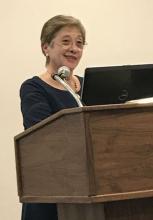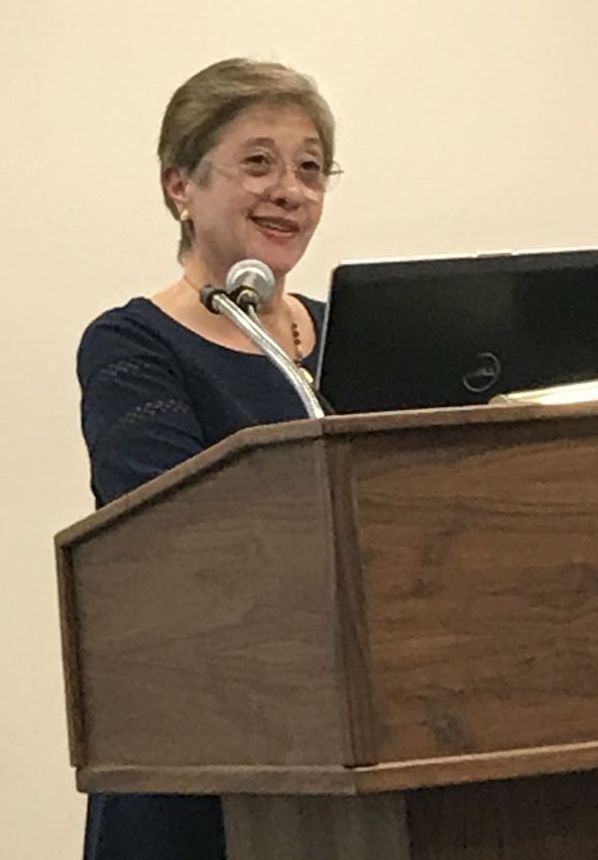User login
NEW YORK – A mental health clinic started for an urban Hispanic community in Connecticut in 1972 continues to generate lessons on how to apply cultural sensitivity to improve care, according to a critical assessment of the program presented at the annual meeting of the American Psychiatric Association.
“Reviews of the literature show that there is a difference when clinicians are culturally responsive and sensitive to the populations they serve,” reported Esperanza Díaz, MD, of the department of psychiatry at Yale University and medical director, Latino Behavioral Health System (LBHS), both in New Haven, Conn.
“How can I talk about depression treatment to a patient who does not have a place to live?” Dr. Díaz asked. Citing a variety of evidence that links mental health to social issues, Dr. Díaz explained, “We learned to partner with everyone in the community to achieve treatment goals.”
By “everyone,” Dr. Díaz was referring to primary care clinicians, family members, church community groups, social support groups, and even local politicians. She also credited success to peer counselors, which are prior patients trained to provide supportive care. Not least important, family members are recruited to help.
“In the Latino community, family is central to identity,” Dr. Díaz explained. One of treatment goals is to help patients reestablish ties with family and other community members who were lost during a mental health crisis. For this task, peer counselors have proven particularly effective for mitigating stigma and providing guidance.
All of these strategies are relevant to cultural competence, a concept for delivering effective mental health services that received particular attention in the DSM-5. Of strategies and tools relevant to this topic in the DSM-5, Dr. Díaz indicated that the Cultural Formulation Interview (CFI) should be considered particularly important for aiding clinicians in understanding mental health issues in a cultural context.
“For us as psychiatrists, the interview is our tool. ” Dr. Díaz asked. She led a recent study demonstrating that the CFI can help clinicians identify unique needs and preferences in a Hispanic population (Psychiatr Serv. 2017 Feb 1;68[2]:112-4). She said the principles of the CFI are relevant to any cultural group.
For evaluating and demonstrating efficacy of mental health services developed for a target cultural group, Dr. Díaz recommended identifying goals and then performance measures to track success. At her own center, quarterly reports track effectiveness and communicate value to the community and those providing funding its activities.
In the period during 2008-2017, 950 adult patients received mental health or substance use services from LBHS, Dr. Díaz reported. In addition to the full-time staff, LBHS has provided training to social workers and psychologists. In addition, 11 psychiatric residents in their third or fourth year of training have worked in LBHS during this period. Many of the peer counselors trained at LBHS have been hired away because of the skills they acquired.
Of the many elements that Dr. Díaz believes are important to the success of the LBHS, “confianza” has provided a key to patient willingness to stay with care through recovery. This word, Spanish for trust, recognizes that patients must have confidence in the ability of clinicians to understand and resolve their problems.
Recognizing the importance of collaborating with the community to design effective therapy, Dr. Díaz also emphasized the importance of humility to the success of LBHS.
“Humility to accept recommendations from people who are not supposedly experts, like family members,” Dr. Díaz said. “We learned that we need to know how to partner.”
NEW YORK – A mental health clinic started for an urban Hispanic community in Connecticut in 1972 continues to generate lessons on how to apply cultural sensitivity to improve care, according to a critical assessment of the program presented at the annual meeting of the American Psychiatric Association.
“Reviews of the literature show that there is a difference when clinicians are culturally responsive and sensitive to the populations they serve,” reported Esperanza Díaz, MD, of the department of psychiatry at Yale University and medical director, Latino Behavioral Health System (LBHS), both in New Haven, Conn.
“How can I talk about depression treatment to a patient who does not have a place to live?” Dr. Díaz asked. Citing a variety of evidence that links mental health to social issues, Dr. Díaz explained, “We learned to partner with everyone in the community to achieve treatment goals.”
By “everyone,” Dr. Díaz was referring to primary care clinicians, family members, church community groups, social support groups, and even local politicians. She also credited success to peer counselors, which are prior patients trained to provide supportive care. Not least important, family members are recruited to help.
“In the Latino community, family is central to identity,” Dr. Díaz explained. One of treatment goals is to help patients reestablish ties with family and other community members who were lost during a mental health crisis. For this task, peer counselors have proven particularly effective for mitigating stigma and providing guidance.
All of these strategies are relevant to cultural competence, a concept for delivering effective mental health services that received particular attention in the DSM-5. Of strategies and tools relevant to this topic in the DSM-5, Dr. Díaz indicated that the Cultural Formulation Interview (CFI) should be considered particularly important for aiding clinicians in understanding mental health issues in a cultural context.
“For us as psychiatrists, the interview is our tool. ” Dr. Díaz asked. She led a recent study demonstrating that the CFI can help clinicians identify unique needs and preferences in a Hispanic population (Psychiatr Serv. 2017 Feb 1;68[2]:112-4). She said the principles of the CFI are relevant to any cultural group.
For evaluating and demonstrating efficacy of mental health services developed for a target cultural group, Dr. Díaz recommended identifying goals and then performance measures to track success. At her own center, quarterly reports track effectiveness and communicate value to the community and those providing funding its activities.
In the period during 2008-2017, 950 adult patients received mental health or substance use services from LBHS, Dr. Díaz reported. In addition to the full-time staff, LBHS has provided training to social workers and psychologists. In addition, 11 psychiatric residents in their third or fourth year of training have worked in LBHS during this period. Many of the peer counselors trained at LBHS have been hired away because of the skills they acquired.
Of the many elements that Dr. Díaz believes are important to the success of the LBHS, “confianza” has provided a key to patient willingness to stay with care through recovery. This word, Spanish for trust, recognizes that patients must have confidence in the ability of clinicians to understand and resolve their problems.
Recognizing the importance of collaborating with the community to design effective therapy, Dr. Díaz also emphasized the importance of humility to the success of LBHS.
“Humility to accept recommendations from people who are not supposedly experts, like family members,” Dr. Díaz said. “We learned that we need to know how to partner.”
NEW YORK – A mental health clinic started for an urban Hispanic community in Connecticut in 1972 continues to generate lessons on how to apply cultural sensitivity to improve care, according to a critical assessment of the program presented at the annual meeting of the American Psychiatric Association.
“Reviews of the literature show that there is a difference when clinicians are culturally responsive and sensitive to the populations they serve,” reported Esperanza Díaz, MD, of the department of psychiatry at Yale University and medical director, Latino Behavioral Health System (LBHS), both in New Haven, Conn.
“How can I talk about depression treatment to a patient who does not have a place to live?” Dr. Díaz asked. Citing a variety of evidence that links mental health to social issues, Dr. Díaz explained, “We learned to partner with everyone in the community to achieve treatment goals.”
By “everyone,” Dr. Díaz was referring to primary care clinicians, family members, church community groups, social support groups, and even local politicians. She also credited success to peer counselors, which are prior patients trained to provide supportive care. Not least important, family members are recruited to help.
“In the Latino community, family is central to identity,” Dr. Díaz explained. One of treatment goals is to help patients reestablish ties with family and other community members who were lost during a mental health crisis. For this task, peer counselors have proven particularly effective for mitigating stigma and providing guidance.
All of these strategies are relevant to cultural competence, a concept for delivering effective mental health services that received particular attention in the DSM-5. Of strategies and tools relevant to this topic in the DSM-5, Dr. Díaz indicated that the Cultural Formulation Interview (CFI) should be considered particularly important for aiding clinicians in understanding mental health issues in a cultural context.
“For us as psychiatrists, the interview is our tool. ” Dr. Díaz asked. She led a recent study demonstrating that the CFI can help clinicians identify unique needs and preferences in a Hispanic population (Psychiatr Serv. 2017 Feb 1;68[2]:112-4). She said the principles of the CFI are relevant to any cultural group.
For evaluating and demonstrating efficacy of mental health services developed for a target cultural group, Dr. Díaz recommended identifying goals and then performance measures to track success. At her own center, quarterly reports track effectiveness and communicate value to the community and those providing funding its activities.
In the period during 2008-2017, 950 adult patients received mental health or substance use services from LBHS, Dr. Díaz reported. In addition to the full-time staff, LBHS has provided training to social workers and psychologists. In addition, 11 psychiatric residents in their third or fourth year of training have worked in LBHS during this period. Many of the peer counselors trained at LBHS have been hired away because of the skills they acquired.
Of the many elements that Dr. Díaz believes are important to the success of the LBHS, “confianza” has provided a key to patient willingness to stay with care through recovery. This word, Spanish for trust, recognizes that patients must have confidence in the ability of clinicians to understand and resolve their problems.
Recognizing the importance of collaborating with the community to design effective therapy, Dr. Díaz also emphasized the importance of humility to the success of LBHS.
“Humility to accept recommendations from people who are not supposedly experts, like family members,” Dr. Díaz said. “We learned that we need to know how to partner.”
REPORTING FROM APA

